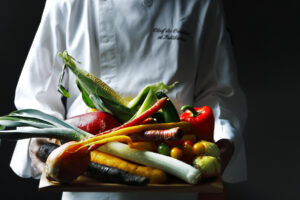
The vegetables used in the dishes of our Hotel’s Restaurant on the 20th floor, and the Private and Banquet Rooms on the 21st floor are mostly grown in Tokyo.
Our head chef Atsushi Ishikawa is very passionate about the high quality and freshness of the Tokyo grown vegetables he uses to prepare delicious fresh vegetable dishes, which over the years have been well received by many of our guests.
【Encounter of Tokyo Grown Vegetables】
Due to the growing number of foreign travelers coming to Japan since 2018, Chef Ishikawa began to think that it would be wonderful to treat foreign travelers to Tokyo grown vegetables. This culminated in him starting to use Tokyo grown vegetables in 2019 grown exclusively on “Koyama Farm”, located in Tachikawa City, Tokyo.
“Koyama Farm” which specializes in growing colorful vegetables has been visited many times by our chef with both his kitchen and restaurant team where they have often actively helped in the field on their many visits. Through these frequent Farm visits, over time, Chef Ishikawa increasingly became more acutely attracted by the embodiment of the passion of the farmers, and over time he ended up falling passionately in love with the high quality and freshness of Tokyo Grown Vegetables.
With this deeply acquired appreciation of the high quality and freshness of Tokyo Grown Vegetables, Chef Ishikawa resolved to specialize in using Tokyo Grown Vegetables in 2020. Since then, he and his team have been introduced to many new and similarly passionate farmers through the alliance of farmers he has been working closely with. To date, we have now established sustainable contracts with eight farms in Tokyo.
【Fascination of Tokyo Grown Vegetables】
Chef Ishikawa has been attracted to Tokyo Grown Vegetables for the following three reasons.
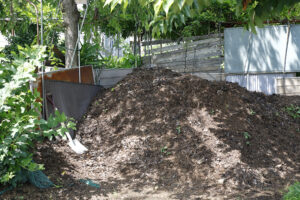
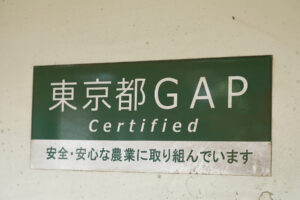
Firstly, there are many farmers with farm-fresh Tokyo produce which are *“Tokyo GAP” certificated. Each *“Tokyo GAP” certificated farmer is very particular about their methods of composting cow and horse manure with branches and leaves of trees, which they passionately believe affect the growing condition and nurturing of their fruits and vegetables. Chef Ishikawa thinks that their original composts help with making their farm-fresh fruits and vegetables noticeably tastier. Additionally, our guests can feel a sense of safety and security consuming dishes served with these naturally fertilized Tokyo grown farm-fresh fruits and vegetables from each of our *“Tokyo GAP” certificated partner farms.
-What is *“Tokyo GAP”?-
*“Tokyo GAP” is a third-party certification system that evaluates the sustainability of farms premised on the following ratings criteria: food safety, environmental conservation, labor and occupational safety, and other metrics. GAP stands for “Good Agricultural Practice,” which means “good farming practices.” GAP refers to the overall agricultural activities, including but not limited to the safety of agricultural products, but also steadfastly engaging in environmentally friendly agriculture and human labor management.
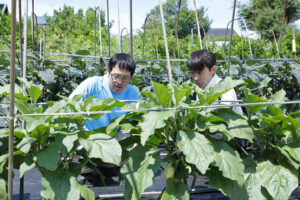
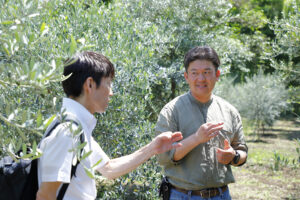
Secondly, it is possible to visit our *“Tokyo GAP” partner farms producing the Tokyo-grown vegetables adorning the dishes we serve at the hotel as many times as needed because of their relatively close proximity to the Hotel. Chef Ishikawa is very fortunate to have had the opportunity to talk with each of our *“Tokyo GAP” partner farmer face-to-face, and establish a deeper relationship due to his many farm visits with his kitchen and restaurant team. If we were to purchase vegetables from the countryside, farmer’s market or wholesalers, there is little to no chance that Chef Ishikawa would be able to meet the farmers individually or visit their farms respectively. Through these direct interactions, we have been able to further deepen our mutual trust and bond with our *“Tokyo GAP” partner farmers by actually visiting their farms and helping actively in their fields.
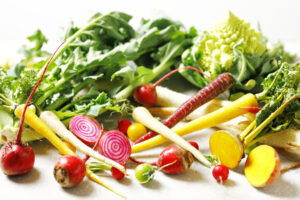
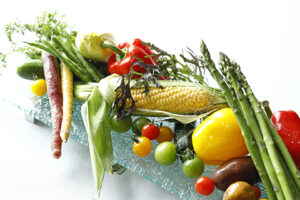
Chef Ishikawa thinks that nothing is more precious than freshness. He wants our hotel guests to enjoy fresh delicious seasonal vegetables. The most important thing for our hotel guest to fully appreciate how delicious freshly harvested vegetables truly are.
The main reason why Chef Ishikawa uses Tokyo grown vegetables is NOT only because of their unparallel freshness BUT perhaps more importantly, it is also because of their farming practices which leads to a fair reduction of CO2. The distance food travels to get onto our plates is also known as food mileage. The greater the food mileage, the greater is the demand for more energy for transportation and storage.
We believe that our efforts to consume locally produced food helps us better align to the SDGs.
【Inquisitive Mind of Vegetables】

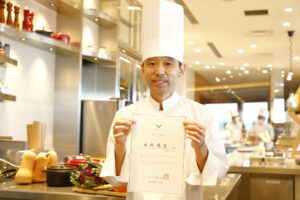
Chef Ishikawa has a diverse background, having trained in France in his twenties, and then upon his return he further honed his skills at hotels in the Odakyu Group.
He was inspired by French chefs who cook a full-course vegetable-only menu or vegetable plates using different kinds of vegetables. Due his training in France, upon his return to Japan, he would visit some of the neighboring farms at his former job, to purchase their freshly harvested vegetables in-person and build sustainable relationships with the farmers. Chef Ishikawa has developed a keen interest in vegetables over his years of working on food safety and security.
In keeping with his aspirations to continuously improve his experience and knowledge as a chef, he became a qualified vegetable sommelier in 2021. By acquiring specialized knowledge of vegetables, Chef Ishikawa has been reminded of the importance of quality ingredients. He has since realized a renewed deep-seated feeling of respect and reverence towards farmers.
【Chef’s Thought】
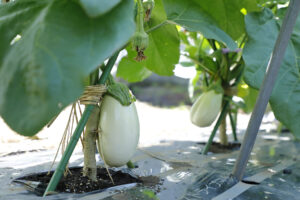
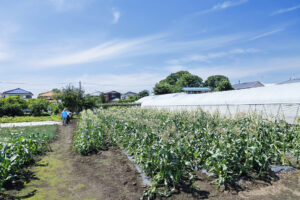
Chef Ishikawa wants our guests to experience a sense of true “Happiness of Mind and Body” by eating safe and secure freshly harvested vegetables, and bring smiles to their faces. On behalf of our farming partners, he also wants to impress upon our guests just how challenging agriculture work is and the passion each farmer puts into growing their vegetables. Chefs cannot do anything without fine ingredients. Chef Ishikawa wholeheartedly thanks each of our partner farmer for the abundance or care and passion they into tending to their fields to deliver farm fresh vegetables in outstanding always.
Tokyo has very limited farmland in residential areas. Chef Ishikawa has heard from the farmers, that aging farmers and the resulting lack of successors is one of their biggest fears. It is believed that a firm which has no successors has no choice in the matter of operating in perpetuity, especially with family-owned-firms.
To this end, Mr. Ishikawa, as a chef, decided to play his little role by incorporating these Tokyo Grown Vegetables farmers’ produce to help motivate and stimulate a sustainable Tokyo agricultural renaissance. He has a vision of expanding his efforts and driving passion on championing the use of local produce for local consumption with an aim of realizing a true reduction of food loss in the future.

